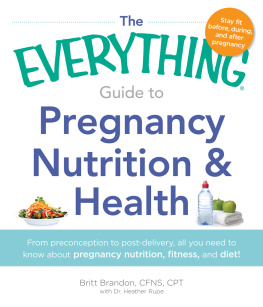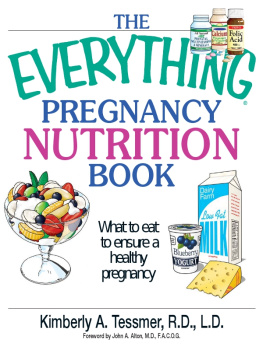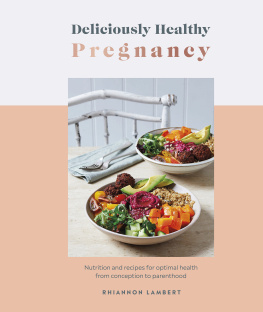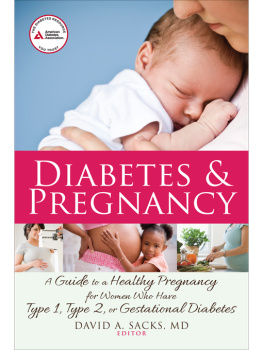Selected Praise for the Authors Previous Books
The concept of glycemic index is key to understanding the effects of carbohydrate on human health.The New Glucose Revolution, written by leading scientists, conveys this information clearly, thoroughly, and convincingly.
Walter Willett, MD, PhD, Professor of Epidemiology and Nutrition, Harvard School of Public Health, on The New Glucose Revolution
This is the best diet book.... I recommend it above all others.
Jean Carper, best-selling author of Miracle Cures and USA Weekend columnist, on The Low GI Diet Revolution
Written by leading authorities in nutrition... this program is simple, practical, and powerful. I recommend it with enthusiasm.
David S. Ludwig, MD, PhD, Director, Obesity Program & Optimal Weight for Life (OWL) clinic, Childrens Hospital Boston, on The Low GI Diet Revolution
Written by the worlds experts on diet and the glycemic index, this book will provide the tools you need to make dietary and lifestyle changes to achieve lifelong health.
Joann E. Manson, MD, DrPH, Professor of Medicine, Harvard Medical School, Chief of Division of Preventive Medicine, Brigham and Womens Hospital, on The New Glucose Revolution for Diabetes
The concept of the glycemic index has been distorted and bastardized by popular writers and diet gurus. Here, at last, is a book that explains what we know about the glycemic index and its importance in designing a diet for optimum health.
Andrew Weil, MD, University of Arizona College of Medicine, author of Eating Well for Optimum Health, on The New Glucose Revolution
This book clearly explains that there are different kinds of carbohydrates that work in different ways and why a universal recommendation to increase the carbohydrate content of your diet is plainly simple and scientifically accurate. Everyone should put the glycemic index approach into practice.
Artemis P. Simopoulos, MD, senior author of The Omega Diet and The Healing Diet and President, Center for Genetics, Nutrition and Health, Washington, DC, on The New Glucose Revolution
The Glucose Revolution is nutrition science for the 21st century. Clearly written, it gives the scientific rationale for why all carbohydrates are not created equal. It is a practical guide for both professionals and patients. The food suggestions and recipes are exciting and tasty.
Richard N. Podell, MD, MPH, Clinical Professor, Department of Family Medicine, UMDNJ-Robert Wood Johnson Medical School, and coauthor of The G-Index Diet: The Missing Link That Makes Permanent Weight Loss Possible, on The Glucose Revolution

The Low GI Eating Plan for an Optimal Pregnancy
The Authoritative Science-Based Nutrition Guide for Mother and Baby
Dr. Jennie Brand-Miller, Dr. Kate Marsh and Dr. Robert Moses

This book is dedicated to our patients and study volunteers, whose questions and welfare have fostered further research, and to all women, who, by reading this book, may improve their pregnancy experience and future quality of life
Jennie, Kate and Bob
Contents
Part 1
Planning your pregnancy
Part 2
So now you are pregnant
Part 3
Beyond Due-Dayyou and your new baby
Part 4
Putting it all on the plate
Part 5
Recipes
Introduction
A pregnancy book like no other
This book about eating for a healthy pregnancy is at the cutting edge of science and medicine. Most pregnancy books will cover nutrition requirements, supplements, foods to emphasize and foods to avoid. This book does that too, but it goes much further. The Low GI Eating Plan for an Optimal Pregnancy has a unique focus on the importance of your weight at the start of pregnancy, your weight gain over the next nine months and your babys birth weight, and the profound effect these have on the future health of you and your baby. The GI, a way of rating the carbs in your diet, is for everybody, but its especially relevant during pregnancy, and this book is aimed squarely at women who are pregnantor planning to be.
What is the GI?
GI stands for glycemic index. Its a scale from 0 to 100 that helps guide carbohydrate choices and is a physiologically based measure of the effect of carbohydrates on blood glucose levels. It provides an easy and delicious way to eat a healthy diet and at the same time control fluctuations in blood glucose. After testing hundreds of foods around the world, scientists have now found that foods with a low GI will have less of an effect on blood glucose levels than foods with a high GI.
The Low GI Eating Plan for an Optimal Pregnancy is not a fad diet, but a safe and healthy action plan for eating before and during pregnancy with many proven value-added benefits. A low GI diet is one in which meals have a lower blood glucose impact. In addition to optimizing your weight gain and nutrient intake throughout pregnancy, you control your blood glucose levels and reduce the chances of developing gestational diabetes or having a complicated delivery.
Pregnancy is a stage in life when the carbohydrates in food play a starring role. This is because your average blood glucose level throughout the day is directly correlated with your babys growth rate in the womb. Quite simply, glucose is the primary fuel that drives all aspects of your babys development. If your glucose levels are too high then your baby will grow too fast and be born with excessive amounts of body fat. This is not a new finding. Its the main reason why women who have type 1 diabetes (a condition that requires daily insulin injections to maintain normal glucose levels) are given close medical attention before and during their pregnancies. Its also the principal reason why all pregnant women are routinely screened during pregnancy to determine if they have developed gestational diabetes. Whats new is that we now know that even mildly elevated glucose levels during pregnancy can have serious consequences.
Even mildly elevated glucose levels during pregnancy can have serious consequences.
Pregnancy is a like a metabolic stress test. Even during the first trimester, your placenta and growing baby draw so much glucose from your bloodstream that your early morning glucose levels are lower than they are in the nonpregnant state. Pregnant women use carbohydrates at a greater rate both at rest and during exercise than do nonpregnant women, so one of the first metabolic adaptations your body makes to pregnancy is a greater capacity to produce glucose in the liver. While this makes perfect sense (if your access to food is temporarily restricted, your growing baby will still be getting the energy it needs), it means that glucose synthesis is always on and thus all women become more resistant to insulins effects as pregnancy progresses. For some women, this precipitates gestational diabetes.
Pregnancy is also a time when women often gain too much weight, compromising not only their own future health, but that of their baby. Traditionally, dietary advice for pregnancy has focused on making sure theres adequate intake of all the essential nutrients. Thats not surprising considering the fact that the requirements for many nutrients are higher than at any other time in life. Unfortunately, weight gain during pregnancy, despite its importance, is not given the emphasis that it deserves. In this book, we show you how to calculate your ideal weight gain (depending on your height and pre-pregnancy weight) and how to monitor it and keep it under your control.










